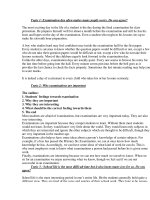Một số bài luận tiếng anh tham khảo lớp 9
Bạn đang xem bản rút gọn của tài liệu. Xem và tải ngay bản đầy đủ của tài liệu tại đây (55.72 KB, 4 trang )
MỘT SỐ BÀI LUẬN MẪU
1. People attend college or university for many different reasons (for example, new
experiences, career preparation, increased knowledge). Why do you think people
attend college or university?
People attend colleges or universities for a lot of different reasons. I believe that the
three most common reasons are to prepare for a career, to have new experiences, and to
increase their knowledge of themselves and the world around them.
Career preparation is becoming more and more important to young people. For
many, this is the primary reason to go to college, They know that the job market is
competitive. At college, they can learn new skill for careers with a lot of opportunities. This
means careers, such as information technology, that are expected to need a large workforce
in the coming years.
Also, students go to colleges and universities to have new experiences. This often
means having the opportunity to meet people different from those in their hometowns. For
most students, going to college is the first time they’ve been away from home by
themselves. In additions, this is the first time they’ve had to make decisions on their own.
Making these decisions increases their knowledge of themselves.
Besides looking for self-knowledge, people also attend a university or college to
expand their knowledge in subjects they find interesting. For many, this will be their last
chance for a long time to learn about something that doesn’t relate to their career.
I would recommend that people not be so focused on a career. They should go to
college to have new experiences and learn about themselves and the world they live in.
2. Do you agree or disagree with the following statement? Parents are the best
teachers.
Throughout my life, I have been lucky enough to have a very good relationship with
my parents. They have supported me, given me necessary criticism, and taught me a great
deal about how to live my life. Parents can be very important teachers in our lives; however,
they are not always the best teachers.
Parents may be too close to their children emotionally. Sometimes they can only see
their children though the eyes of a protector. For example, they may limit a child's freedom
in the name of safety. A teacher might see a trip to a big city as a valuable new experience.
However, it might seem too dangerous to a parent.
Another problem is that parents may expect their children's interests to be similar to
their own. They can't seem to separate from their children in their mind. If they love science,
they may try to force their child to love science too. But what if their child's true love is art, or
writing, or car repair?
Parents are usually eager to pass on their value to their children. But should children
always believe what their parents do? Maybe different generations need different ways of
thinking. When children are young, they believe that their parents are always rights. But
when they get older, they realize there are other views. Sometimes parents, especially older
ones, can't keep up with rapid social or technology changes. A student who has friends of all
different races and backgrounds at school may find that her parents don't really understand
or value the digital revolution. Sometimes kids have to find their own ways to what they
believe in.
The most important thing to realize is that we all have many teachers in our lives.
Our parents teach us, our teachers teach us, and our peers teach us. Books and
newspapers and television also teach us. All of them are valuable.
3. Nowadays, food has become easier to prepare. Has this change improved the way
people live?
The twentieth century has brought with it many advances. With those advances,
human lives have changed dramatically. In some ways life is worse, but mostly it is better.
Changes in food preparation methods, for example, have improved our lives greatly.
The convenience of preparing food today is amazing. Even stoves have gotten too
slow for us. Microwave cooking is much easier. We can press a few buttons and a meal is
completely cooked in just a short time. People used to spend hours preparing an oven-
cooked meal, and now they can use that time for other, better things. Plus, there are all
kinds of portable, prepackaged foods we can buy. Heat them in the office microwave, and
lunch at work is quick and easy.
Food preparation today allows for more variety. With refrigerators and freezers, we
can preserve a lot of different foods in our homes. Since technology makes cooking so
much faster, people are willing to make several dishes for even a small meal. Parents are
more likely to let children be picky, now that they can easily heat them up some
prepackaged macaroni and cheese on the side. Needless to say, adults living in the same
house may have very different eating habits as well. If they don’t want to cook a lot of
different dishes, it’s common now to eat out at restaurants several times a week.
Healthful eating is also easier than ever now. When people cook, they use new fat
substitutes and cooking sprays to cut fat and calories. This reduces the risk of heart disease
and high cholesterol. Additionally, we can buy fruits and vegetable fresh, frozen or canned.
They are easy to prepare, so many of us eat more of those nutritious items daily. A hundred
years ago, you couldn’t imagine the process of taking some frozen fruit and ice from the
freezer, adding some low-fat yogurt from a plastic cup and some juice from a can in the
refrigerator, and whipping up a low-fat smoothie in the blender!
Our lifestyle is fast, but people still like good food. What new food preparation
technology has given us is more choices. Today, we can prepare food that is more
convenient, healthier, and of greater variety than ever before in history.
4. It has been said, “Not every thing that is learned is contained in books.”
Compare and contrast knowledge gained from experience with knowledge gained
from books. In your opinion, which source is more important? Why?
“Experience is the best teacher” is an old saying, but I agree with it. The most
important, and sometimes the hardest, lessons we learn in life come from our participation in
situations. You can’ learn everything from a book.
Of course, learning from books in a formal educational setting is also valuable. It’s in
schools that we learn the information we need to function in our society. We learn how to
speak and write and understand mathematical equations. This is all information that we
need to live in our communities and earn a living.
Nevertheless, I think that the most important lessons can’t be taught; they have to be
experienced. No one can teach us how to get along with others or how to have self-respect.
As we grow from children into teenagers, no one can teach us how to deal with peer
pressure. As we leave adolescence behind and enter adult life, no one can teach us how to
fall in love and get married.
This shouldn’t stop us from looking for guidelines along the way. Teachers and
parents are valuable sources of advice when we’re young. As we enter into new stages in
our lives, the advice we receive from them is very helpful because they have already bad
similar experiences. But experiencing our own triumphs and disasters is really the only way
to learn how to deal with life.
5. A company has announced that it wishes to build a large factory near your
community. Discuss the advantages and disadvantages of this new influence on your
community. Do you support or oppose the factory? Explain your position.
New factories often bring many good things to a community, such as jobs and
increased prosperity. However, in my opinion, the benefits of having a factory are
outweighed by the risks. That is why I oppose the plan to build a factory near my community.
I believe that this city would be harmed by a large factory. In particular, a factory
would destroy the quality of the air and water in town. Factories bring smog and pollution. In
the long run, the environment will be hurt and people’s health will be affected. Having a
factory is not worth that rise.
Of course, more jobs will be created by the factory. Our population will grow. To
accommodate more workers, more homes and stores will be needed. Do we really want this
much growth, so fast? If our town is going in growth, I would prefer slow growth with good
planning. I don’t want to see rows of cheaply constructed townhouses. Our quality of life
must be considered.
I believe that this growth will change our city too much. I love my hometown because
it is a safe, small town. It is also easy to travel here. If we must expand to hold new citizens,
the small-town feel will be gone. I could miss that greatly.
A factory would be helpful in some ways. However, I feel that the dangers are greater than
the benefits. I cannot support a plan to build a factory here, and hope that others feel the
same way.
6. If you could change one important thing about your hometown, what would you
change?
If I could change one thing about my hometown, I think it would be the fact that there's no sense
of community here. People don't feel connected, they don't look out for each other, and they
don't get to know their neighbors.
People come and go a lot here. They change jobs frequently and move on. This means
that they don't put down roots in the community. They don't join community organizations and
they're not willing to get involved in trying to improve the quality of life. If someone has a petition
to put in a new street light, she has a very hard time getting a lot of people to sign. They don't
feel it has anything to do with them. They don't get involved in improving the schools because
they don't think the quality of education is important to their lives. They don't see the connection
between themselves and the rest of their community.
People don't try to support others around them. They don't keep a friendly eyes on their
children, or check in on older folks if they don't see them for a few days. They're not aware when
people around them may be going through a hard time. For example, they may not know if a
neighbor loses a loved one. There's not a lot of community support for individuals.
Neighbors don't get to know each other. Again, this is because people come and go
within a few years. So when neighbors go on vacation, no one is keeping an eye on their house.
No one is making sure nothing suspicious is going on there, like lights in the middle of the night.
When neighbors' children are cutting across someone's lawn on their bikes, there's no friendly
way of casually mentioning the problem. People immediately act as if it's a major property
disagreement.
My hometown is a nice place to live in many ways, but it would be much nice if we had that
sense of community.









